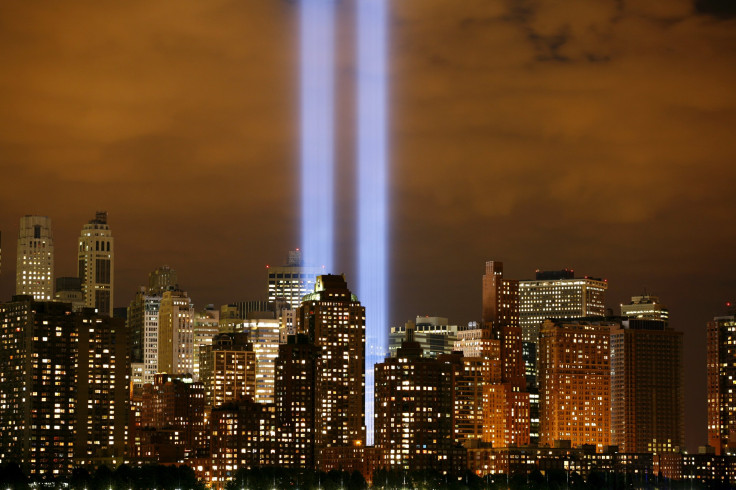The United States After 9/11: 6 Things That Have Changed Since 2001

The impact of the 9/11 attacks, which killed nearly 3,000 people, is still being felt in 2015. Industries have changed policies, the government formed new agencies and the hearts and minds of Americans have been changed. Here's a look at a six things that are permanently different because of Sept. 11.
Airports
Shortly after the attacks, the federal government created the Transportation Security Administration (TSA) and, on Nov. 19, 2001, Congress passed the Aviation and Transportation Security Act. That agency and that law are the reasons you need to show up at the airport a few hours before your flight, take your shoes off as you pass security and can’t bring liquids on the plane.
“Consider that before September 11, 2001, there was no cohesive system in place to vet passengers in advance of flying; only limited technologies in place for uncovering a wide array of threats to passengers or aircraft; no comprehensive federal requirements to screen checked or carry-on baggage; and only minimal in-flight security on most flights,” John S. Pistole, then TSA administrator, said in a speech on the 10th anniversary of 9/11.
Airplane security also changed after 9/11, with the Federal Aviation Administration establishing policies to prevent the takeover of planes. Cockpits are now locked and only the pilot, from inside the cockpit, can unlock the doors. However, that has brought its own challenges, as evidenced by the Germanwings crash.
Immigration
About a year after 9/11, U.S. immigration policy changed drastically with the Homeland Security Act and the Enhanced Border Security and Visa Entry Reform Act of 2002, according to the American Bar Association. Visas became harder to come by for tourists, students and foreign nationals and those who were admitted into the country were subject to further scrutiny as fingerprints and other biometric data was collected. The Department of Homeland Security, formed Nov. 25, 2002, and the U.S. Immigration and Customs Enforcement (ICE), formed in 2003, are tasked with the protection of the U.S. and its borders. The immigration policy affected people from Mexico and Latin America -- despite their having nothing to do with 9/11 -- and their path to U.S. citizenship.
Domestic Spying
Less than two months after 9/11, President George W. Bush signed the Patriot Act, which was extended in 2011 by President Barack Obama. Further, the federal government expanded the ability of the National Security Agency (NSA) to collect data on U.S. citizens, foreign nationals and governments. The extent of that expansion did not become publicly known, however, until 2013 when Edward Snowden revealed the extensive scope of the NSA's domestic spying. Cellphones, email and corporate data were subject to NSA surveillance without a warrant. The Electronic Frontier Foundation has an extensive timeline of the NSA's domestic spy program, from its covert formation a month after 9/11 to the formation of a secret room built in AT&T's San Francisco office and, thirdly, its relationship with Britain's Government Communications Headquarters.
In June 2015 the USA Freedom Act severely limited the NSA's ability to collect phone data in bulk.
Trust In The Government
There was a time, shortly after 9/11, that U.S. citizens had great trust in their federal government. In fact, trust in the government hit a peak not seen since the 1970s, according to historical Pew Research data. This was in response to the terrorist attacks. But that trust began fading due to the 2008 recession, wars in Afghanistan and Iraq, privacy concerns and a growing political divide. By 2013, Americans' trust in their government had fallen to 19 percent, according to Pew. A Gallup poll from 2014 placed that number around 24 percent. That distrust has continued at a low level. Much of the recent distrust has been due to the growing gap between Democrats and Republicans and an ineffective Congress. Those who have confidence in Washington have become a distinct minority: A Gallup poll from June 2015 put trust in Congress -- categorized as "great deal" and "quite a lot" of trust -- at a paltry 8 percent.
Tourism
Travel to the United States after 9/11 decreased for three years after the attacks, but then international tourists began returning -- and in record numbers. In 2007, 60 million international travelers visited the U.S. This year that number has climbed to 74.8 million. Outbound tourism has also rebounded, with 68.2 million Americans traveling overseas in 2014.
Another controversial byproduct of the attacks has been 9/11 tourism in New York City. The 9/11 Memorial and Museum in Manhattan has received millions of visitors, while guided tours of lower Manhattan are also daily events. The Freedom Tower and the recently opened One World Observatory, built on the site of the twin towers that were destroyed on 9/11, are also popular tourist destinations.
American Psyche
Psychologically speaking, Americans have changed since 9/11. In some ways -- whether it's further awareness of foreign threats or the idea that the U.S. is not completely safe -- Americans underwent an existential crisis. "Despite the technological advantages, relative safety and general happiness, there's also a bit of fear. Beneath everything there’s a profound malaise about life and uncertainty about the future, because now we’ve opened up a new dimension that reverses the natural sequence of how things have always been," Charles B. Strozier, a psychoanalyst from John Jay College of Criminal Justice in New York City told Psychology Today.
© Copyright IBTimes 2024. All rights reserved.





















